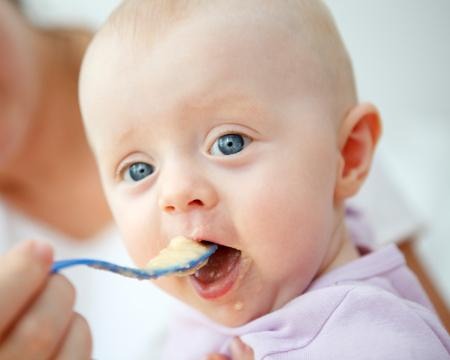Cooking For Baby: 5 Things You Must Know To Get Started
We may receive a commission on purchases made from links.
When my daughter started solids I became obsessed with making my own baby food. I am a food writer after all. I learned it's no longer just for earthy crunchy types, freezing big batches is ideal and it's an easy and satisfying way to introduce baby to great, pure food.
Here are five tips to keep in mind when starting out in the realm of baby food:
1. Necessary Tools
There are some all in one devices on the market that will steam and purée your baby food in one go, but they are expensive, made of plastic and, quite frankly unnecessary in my humble opinion. All you really need are a sauce pan, a steamer basket, a strainer and either a food mill or a mini Cuisinart. You probably already have most if not all of these tools.
To store baby food in the freezer look out for mini sealed containers like these or these. I like those that hold individual portions as it makes life easier when defrosting and reusing.
2. Roast, Steam and Mash
Forget about knife skills, the only technique you need in the beginning is roasting (ie. sweet potatoes), steaming (ie. apricots and prunes) and mashing (ie. bananas and avocadoes). The beauty of baby food is it's a great way for beginner cooks to get started in the kitchen and you can add to your repertoire as your baby's needs increase.
3. Use Breast Milk or Formula
Most foods are too thick for a new eater even when pureed so thinning out pureed bananas with a little breast milk or formula will make it easier for baby to swallow. Plus, mixing a new food with their familiar favorite is a great way to help baby get use to eating solids.
4. One Food at a Time
In an effort to pin point any allergies, you want to keep things pure at the very beginning. Talk to your doctor about first foods, but I started out with mashed bananas. Feed only that to your baby for three days. If there is no reaction, then you can add in another whole food like sweet potato, test for three days and then move on. Once you've tried each food individually, you can start having a little fun with mixing and matching.
5. Don't Salt or Sugar
While I'm all for trying spices once a baby is older, adding sodium and sugar to a baby's diet really isn't necessary. It's best to introduce them to pure whole foods at the beginning so they develop a taste for the real deal than for extra salt and sugar.
Click here to see the roasted sweet potatoes and steamed carrots recipes.
